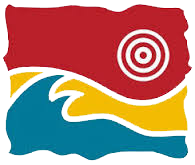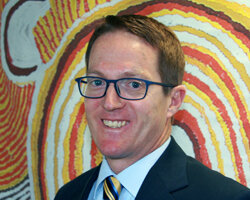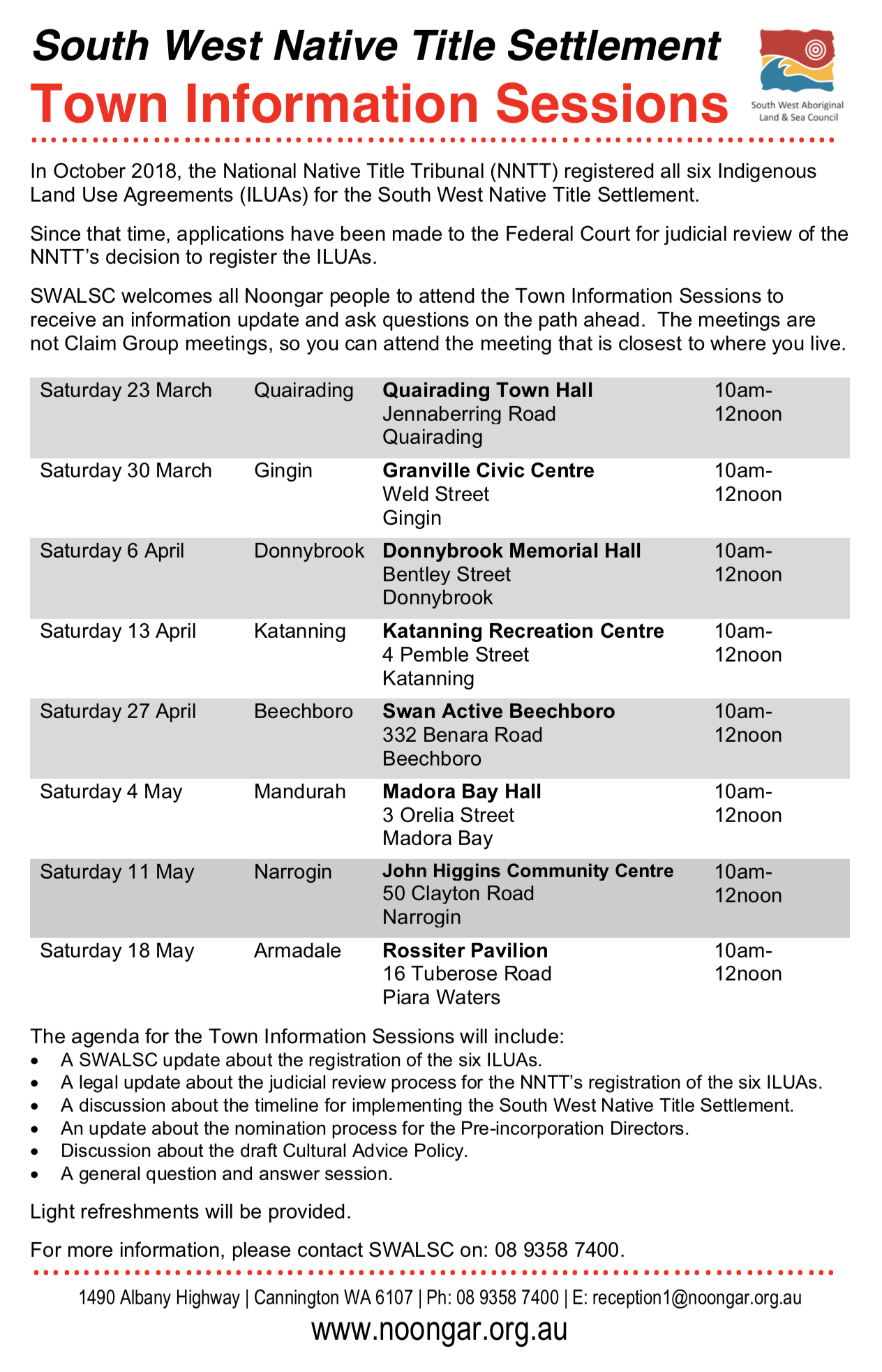Jeanice Krakouer, Chairperson of the South West Aboriginal Land and Sea Council (SWALSC), has welcomed today’s decision by the Registrar of the National Native Title Tribunal (NNTT) to register all six Indigenous Land Use Agreements (ILUAs) that were agreed between the Noongar People and the State of Western Australia in 2015.
This decision comes a year after the Registrar of the NNTT received the ILUAs for consideration, and is a significant milestone towards the implementation of the South West Native Title Settlement.
These six ILUAs are the binding legal documents that make the South West Native Title Settlement between the Noongar People and the State of Western Australia enforceable.
These six ILUAs set out the terms and conditions that the State of Western Australia has agreed to be bound by in exchange for the Noongar people agreeing to settle claims under the Native Title Act.
These conditions agreed to by the State of Western Australia, include:
An Act of the Western Australian Parliament recognising the Noongar People as the Traditional Owners of Noongar Boodja (Noongar lands).
The return, by the State Government, of up to 320,000 hectares of development and cultural land to the Noongar People, to be held by the Noongar Boodja Trust.
Twelve payments of $50 million a year into a perpetual Trust for the exclusive use and benefit of the Noongar People.
Twelve payments of $10 million a year for 12 years for the establishment and initial operation of the six Noongar Regional Corporations and one Central Services Corporation.
Agreement by the State to enter into joint management of National Parks and the South West Conservation Estate in Noongar Boodja; and
Access by Noongar people to Crown lands for Noongar People to undertake customary activities.
Quotes for attribution to SWALSC Chairperson, Jeanice Krakouer:
“We are delighted with the outcome of today’s decision.”
“This is a great opportunity for the Noongar People to come together, to control our own destiny, and to build a solid future for generations to come.”
Although the agreements have been registered, there is still the possibility that some objectors may seek judicial review in the Federal Court.
The settlement will commence only after all legal proceedings have been exhausted.
Ends.
NNTT Decision on ILUAs due mid-October 2018
SWALSC has been advised that the Registrar of the National Native Title Tribunal (NNTT) will announce the decisions on whether or not she registers the six Indigenous Land Use Agreements (ILUAs) that form the South West Native Title Settlement on, or around, 17 October 2018.
By the time the Registrar announces these decisions, it will have been more than a year from relodging applications for registration of the ILUAs.
Following the relodging of the ILUAs, a 'notice period' began which allowed any person claiming to hold native title in relation to any area of land covered by the ILUAs with the opportunity to object in writing if they believed that the applications to register the six ILUAs were not properly certified.
SWALSC was advised by the Registrar several times that the notice period had been extended to provide more time and procedural fairness for people seeking to lodge objections to the registration of the ILUAs.
SWALSC was given the opportunity to provide comment on each of the objections that were lodged during the notice period, and provided these comments to the Registrar to consider.
SWALSC respects the right of people to lodge objections to the registration of the ILUAs and will continue to respect the confidentiality of the process by not disclosing any details about the objections SWALSC provided comments about to the Registrar.
SWALSC thanks the Noongar community for their continued patience and understanding while we wait for the Registrar’s decisions.
Expressions of Interest Called for Newmont Boddington Gold - Moorditj Booja Community Partnership Agreement (CPA) Relationship Committee
Newmont Boddington Gold - Moorditj Booja Community Partnership Agreement (CPA) Relationship Committee is seeking 7 GKB Representatives to inter alia monitor the progress of the implementation of the CPA against the principles and targets set out in the CPA.
Term and time commitment
The term of appointment will be for 3 years, beginning from the first meeting in 2018. During the three-year term the appointed representative will meet on a quarterly basis, usually at NBG premises in Boddington.
Remuneration
The appointed representatives will be entitled to sitting fees for the day they attend the meeting and eligible to claim travel allowance reimbursements for fuel. Lunch is usually provided by NBG.
Selection Criteria
To be eligible for this appointment you must:
1. Be a member of the GKB Claim Group and have:
2. Well-developed communication and interpersonal skills;
3. Advanced conceptual and problem-solving skills;
4. Awareness of and ability to identify areas of need in GKB community;
5. Ability to liaise with external stakeholders;
6. Good standing within the GKB community.
The selection process will be facilitated by an independent selection panel, administered by the South West Aboriginal Land and Sea Council (SWALSC) Successful applicants will then be appointed by the GKB Working Party.
How to apply
Applicants to provide evidence of their experience and knowledge that is relevant to the role and must address each of the above selection criteria.
Application forms can be obtained by phoning Angela on 9358 7400 or emailing human.resources@noongar.org.au, and completed forms can be emailed to human.resources@noongar.org.auor handed in to SWALSC reception at 1490 Albany Hwy, Cannington.
Note: the ONLY applications considered will be the ones submitted on the official application form, no email, over the phone or other expressions of interest will be considered.
Applications close on 22/06/18.
Should you require any further information, please contact Peter Nettleton, peter.nettleton@noongar.org.auor on 9358 7400.
Expression of Interest Form
Cultural Advice Policy Elder Workshops
When the South West Native Title Settlement is implemented, and the six Noongar Regional Corporations are being created, the rule book for each Regional Corporation requires each Corporation establish and regularly update a ‘Cultural Advice Policy’. This Cultural Advice Policy must be endorsed by the members of each Corporation at a General Meeting.
The purpose of the Cultural Advice Policy is to set out the way that each of the six Regional Corporations will make cultural decisions, and how the Corporations will provide support to the Noongar Elders who will advise the Corporations on cultural governance in accordance with the Policy.
SWALSC recently appointed Tony Walley as a Cultural Governance Manager to engage and consult with Elders across Noongar country about the Cultural Advice Policies, and to discuss ways the Policies can be developed, implemented and managed as part of each Regional Corporation’s business.
Tony has been conducting a series of initial workshops with Elders to discuss important questions like: ‘What is a Noongar Elder?’; ‘What should the roles and responsibilities for Elders be under the Cultural Advice Policy?’; ‘What sort of governance model would work best?’; and ‘How should our Elders be represented in this governance model?’ These workshops will inform later meetings that will prepare the draft Cultural Advice Policies for a General Meeting of the Regional Corporations to consider.
A further fifteen of these Elder workshops will be conducted across Noongar Country in April and May. If you would like to know more about these workshops or the work going into developing these Cultural Advice Policies, please contact Tony Walley by phone on (08) 9358 7400, or via email on: Tony.Walley@noongar.org.au
Review of the Aboriginal Heritage Act 1972
Ben Wyatt MLA, Minister for Aboriginal Affairs, has announced a review of the Aboriginal Heritage Act 1972, aimed at delivering modern legislation that operates in a way that meets the needs of all stakeholders. The review is a priority of the State Government and it aims to have amended legislation passed by both houses of Parliament by the end of 2020. The review will include three consultation phases:
Phase One
Release of a Consultation Paper to seek public comment on aspects of the Act as it operates now.
Phase Two
Release of Discussion Paper outlining proposals for public comment.
Phase Three
The draft legislation, or ‘Green Bill’, will be published for stakeholder and community consultation. The outcome of this consultation will inform the final version of the new legislation, which will be introduced into Parliament.
The first phase commenced on 8 March 2018 with the release of the Consultation Paper. The Consultation Paper consists of questions on key aspects of the Act to help identify the main issues, any gaps in the legislation, and ideas on what modernised legislation should set out to do and how it should operate in the interests of all stakeholders.
It is essential that the views and ideas of all interested persons and organisations are heard through this review process, and there are a number of ways to get involved. The Department of Planning, Lands and Heritage will be holding a series of workshops designed for Aboriginal people in each region to provide them with a culturally appropriate forum to have their say in the review. All other stakeholders will be provided with opportunities through broader workshops to be held in key locations and in Perth. The dates and locations of the workshops can be found on the review’s web page (www.daa.wa.gov.au).
In addition to the workshops, submissions can be made by completing an online survey, writing a submission or sending an email. Details are included in the Consultation Paper or on the review’s web page (www.daa.wa.gov.au).
The closing date for submissions for this first phase of the consultation process is Friday 1 June 2018. Please follow the links above to find out how you can have your say.
second round of Elders workshops for cultural advice policy
Each of the six Noongar Regional Corporations that will be created as a part of the South West Native Title Settlement will be required to implement a Cultural Advice Policy to provide ongoing support to cultural governance and decision-making within the Corporations.
SWALSC is conducting a round of meetings with Elders across Noongar Boodja to discuss:
• Background (SWALSC and Rule Book)
• Establishment of the six Regional Corporations
• Cultural Advice Policy
• Elders (definition, understanding, culturally, historically)
• Elders in contemporary society
• Cultural Governance, Authority and Decision-making
• Communication
• Administration and Support
• Open Discussion
• Feedback & Summary
• Next Steps
Meeting dates
Kwinana / Rockingham, 10am, Wednesday 7 February 2018, Medina Aboriginal Corporation, 13 Leasham Way, Medina.
Busselton, 10am, Saturday 10 February 2018, Busselton Esplanade Hotel, 30 Marine Terrace, Busselton.
Katanning, 10am, Monday 19 February 2018, Katanning Leisure Centre, 4 Pemble Street, Katanning.
Gnowangerup, 10am, Tuesday 20 February 2018, Gnowangerup Sporting Complex, Strathaven Road, Gnowangerup.
Esperance, 10am, Wednesday 21 February 2018, Lotteries House, 3 Forrest Street, Esperance.
Kojonup, 10am, Wednesday 28 February 2018, Kodja Place, 143 Albany Highway, Kojonup.
Mt Barker, 10am, 1 March 2018, Community Resource Centre, 1 Lowood Road, Mt Barker.
Albany, 10am, 2 March 2018, Motel Le Grande, 479 Albany Highway, Albany.
If you are not able to attend the Elders Forums, but would like to know more about the formation of the cultural advice policies, please contact Tony Walley, Cultural Governance Manager at SWALSC, on (08) 9358 7423 or 0477 711 628, or by email at: tony.walley@noongar.org.au
Public Information Forums
SWALSC is holding six Community Information Forums about the progress of the South West Native Title Settlement since the Authorisation Meetings held in early 2015. The Forums will provide the Noongar community with the opportunity to ask questions about where we have been, and where we are going. The Forums are not Claim Group Meetings, so any Noongar person who lives nearby is welcome to attend. Light refreshments will be provided.
Albany Forum, 14 October 2017, 10:30am-12:30pm, Motel Le Grande.
Busselton Forum, 21 October 2017, 10:30am-12:30pm, Busselton Youth & Community Centre.
Bunbury Forum, 28 October 2017, 10:30am-12:30pm, Bunbury Regional Entertainment Centre.
Northam Forum, 4 November 2017, 10:30am-12:30pm, Northam Town Hall.
Moora Forum, 11 November 2017, 10:30am-12:30pm, Moora Recreation Centre.
Cannington Forum, 18 November 2017, 10:30am-12:30pm, Canning Town Hall.






